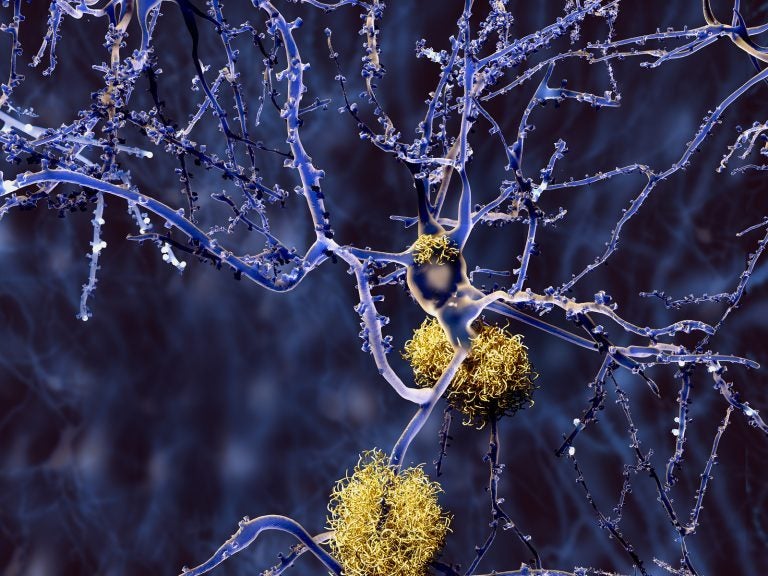New law may spur earlier Alzheimer’s diagnoses in communities of color
Alzheimer’s activists hope a new federal law and $100 million in funding will spur earlier diagnoses in communities of color and better care for millions of patients.

Amyloid plaques accumulate outside neurons. Amyloid plaques are characteristic features of Alzheimer's disease. (Animaxx3d/BigStock)
More funding to help Alzheimer’s patients will soon be available thanks to federal legislation passed at the end of last year. Local advocates hope it will create opportunities to bring better care to those with the disease and reduce race-related disparities in Philadelphia-area communities.
Known as the BOLD Infrastructure for Alzheimer’s Act, the law authorizes up to $100 million over five years to help states and communities build up their public health infrastructure for addressing Alzheimer’s and other forms of dementia.
Katie Macklin, senior director of advocacy for the Alzheimer’s Association Delaware Valley Chapter, said that the law’s public health approach could help do away with old attitudes that see Alzheimer’s symptoms as a normal part of getting old, failing to recognize them as signs of an illness leading to progressive cognitive decline.
“It has been historically viewed as an aging issue,” Macklin said. “I think now having this new law is going to help elevate it as that public health issue.”
The law calls for the creation of Centers of Excellence centers in every state to lead public health interventions aimed at Alzheimer’s and other dementias. That includes educating more doctors and the public about the disease; adding resources for programs that support caregivers and addressing disparities experienced by minority groups.
It could help more of the 5.7 million Americans currently living with Alzheimer’s disease get the proper medical care, Macklin said. The BOLD Act aims to get more people with Alzheimer’s an official diagnosis earlier in the course of the disease. Macklin said that about half of all those with Alzheimer’s never receive a diagnosis at all.
Delayed diagnosis is a common problem in African-American communities, said Louis Colbert, vice president of operations at the Philadelphia Corporation for the Aging.
“A lot of times, especially in African-American communities, family members may begin to see early signs of Alzheimer’s and simply want to dismiss it as, ‘Oh, mom or dad is just getting old,’ ” Colbert said.
According to the Alzheimer’s Association, African-Americans are twice as likely to develop Alzheimer’s as whites, and Hispanics are one and a half times more likely. The reasons for that disparity are unknown, but a recent study suggests that the biology of the disease could be different in African-Americans, who have been included less often in research studies.
Colbert said he sees the potential for the law to reduce disparities related to Alzheimer’s disease among communities of color in Philadelphia, where nearly half the population is black.
There are still no treatments that cure or slow the course of the disease, but Macklin said getting an earlier diagnosis can improve quality of life for patients and their caregivers.
“[It] allows people to access available treatments, build a care team, benefit from care planning sessions, participate in support services, enroll in clinical trials… so there’s a lot of benefit,” she said.
Separate from the BOLD Act, Congress also increased federal funding for research into new treatments for Alzheimer’s this year to $2.3 billion, up from $1.9 billion last year.
WHYY is your source for fact-based, in-depth journalism and information. As a nonprofit organization, we rely on financial support from readers like you. Please give today.





